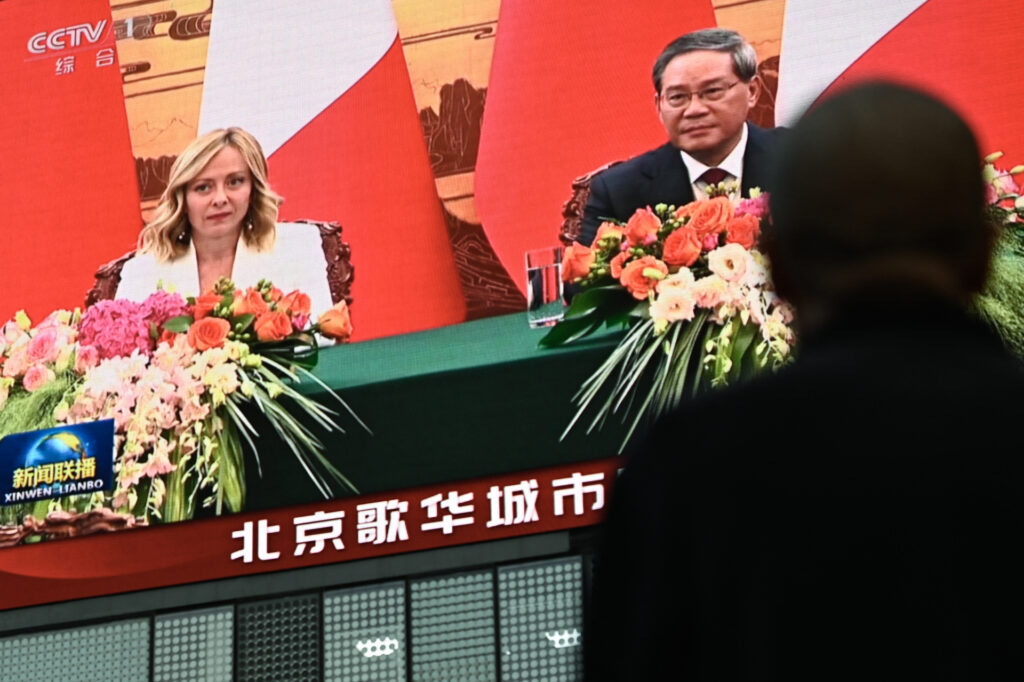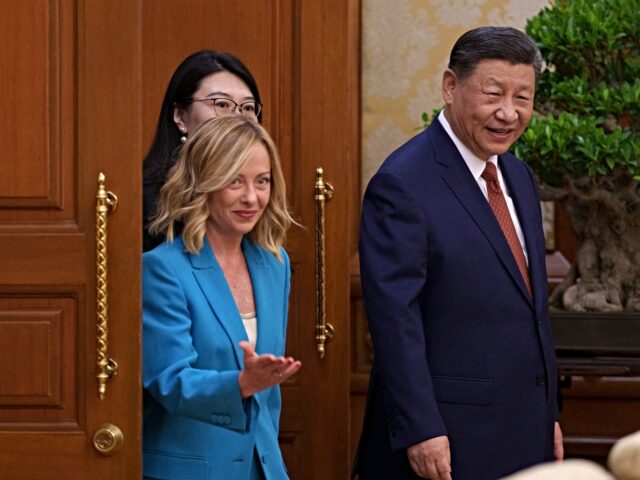Italian Prime Minister Giorgia Meloni arrived in Beijing on Saturday for a five-day visit intended to “relaunch” relations between Italy and China.
On Sunday, Meloni met with Chinese Premier Li Qiang and signed a three-year action plan to increase trade and improve economic cooperation.
Meloni paid her first official visit to China eight months after Italy formally announced it was withdrawing from China’s Belt and Road Initiative (BRI).
Italy dropped out after China rejected its requests for changes to the 2019 memorandum of understanding (MOU) that brought Italy into the Chinese Communist Party’s vast program to extend its influence around the world through infrastructure projects.
Italy was the first G7 nation to join BRI, causing headaches across the rest of Europe and in Washington. Meloni criticized the MOU during her election campaign, calling it a “big mistake.” Other Italian officials complained the BRI agreement did not bring Italy the benefits China promised.
Withdrawing from BRI was a way for Meloni to realign Italy back toward the United States and NATO, so her decision naturally did not sit well with Beijing. The “memorandum of industrial cooperation” she signed with Li on Sunday was a consolation prize, an effort to soothe hurt feelings by reassuring the prickly Chinese Communist government that Italy still values its economic relationship with China.

A man watches a screen showing news coverage of Italy´s Prime Minister Giorgia Meloni meeting China’s Premier Li Qiang in Beijing on July 28, 2024. (PEDRO PARDO/AFP via Getty Images)
Meloni called the agreement a “significant step” toward resetting relations and a means of demonstrating to Beijing that her government has “the will to start a new phase,” adding the new memorandum “includes strategic industrial sectors such as electric mobility and renewables, sectors where China has already been operating on the technological frontier for some time.”
Meloni’s mention of electric vehicles (EVs) was significant because the European Union has imposed tariffs on Chinese EVs to protect domestic markets, and China has retaliated with ginned-up “anti-dumping investigations” of European pork exports.
“Chinese investment in Italy is about a third of the level of Italian investments in China. It’s a gap that I’d like to see narrowed in the right way,” she added.
The pair attended a Chinese-Italian business forum later on Sunday, at which Li said China’s effort to improve its industrial strength will require the kind of “high-quality products” Italy can provide.
Li promised to make Chinese markets more open, transparent, and fair to foreign companies, but said he also wants “the Italian side” to “work with China to provide a more fair, just and non-discriminatory business environment for Chinese companies doing business in Italy.”
Meloni met with Chinese dictator Xi Jinping on Monday to discuss the wars in Ukraine and Gaza, as well as “growing tensions in the Indo-Pacific.”
“There is growing insecurity at the international level, and I think that China is inevitably a very important interlocutor to deal with all these dynamics,” Meloni said, an excruciatingly polite way of saying that China is driving that insecurity by using force to seize territory from its smaller Indo-Pacific neighbors.
Xi responded that Italy should “uphold the spirit of the Silk Road” even though it withdrew from BRI, so the “the bridge of communication between East and West, through it, can rebound into a new era.”
Chinese state media taunted Meloni as a puppet of the sinister United States when Italy pulled out of BRI, but Chinese coverage of her visit to Beijing over the weekend was much more positive.
“Amid a volatile political landscape in Europe and the U.S., Meloni’s visit serves a good opportunity to inject stability, promote cooperation and resolve differences, not only between China and Italy, but China and Europe as a whole,” the state-run Global Times gushed on Sunday.
“However, the experts caution that the Italian government needs to demonstrate enough sincerity in cooperating with China after Italy’s withdrawal from the Belt and Road Initiative (BRI), and effectively manage differences, particularly in tariff talks on China-made electric vehicles,” the Global Times added menacingly.
The Global Times quoted various “Chinese experts” who said Meloni was effectively looking for a way to get Italy back into China’s good graces without rejoining BRI, because doing so would anger Washington.
The paper quoted Italian commentators singing China’s praises and rebuffing the EU’s complaint that China’s production “overcapacity” would enable it to flood Europe with cheap EVs. China used these quotes as evidence that some “silent majority within the EU” wants to dispense with tariffs and embrace Chinese electric vehicles with gusto.
The Global Times hoped Meloni could rekindle Italy’s relationship with China and fortify Europe against “divisive tactics” before the “worst-case scenario” of Donald Trump returning to the U.S. presidency in November.
“Some observers believe that Meloni hopes the visit will ease the tensions with China that have persisted over the past year, open up markets for Italian businesses and attract Chinese investment. However, she must also ensure that Italy does not stray too far from the “de-risking” agenda being promoted by Brussels,” the Global Times said in another editorial on Saturday, once again pushing its theme of American and European bullies keeping the Italians from falling into China’s arms.
The Chinese Communist paper quoted former Italian undersecretary of state for economic development Michele Geraci complaining that “Italy’s approach to China is heavily influenced by U.S.-China relations.”
“Caught between the economic attraction of China and the strategic demands of its Western allies, Italy must navigate a complex landscape,” Geraci said.
“Within the EU, Italy likely sees itself as a mediator, advocating for a balanced approach that safeguards European interests while avoiding unnecessary escalation. This diplomatic tightrope walk underscores Italy’s attempt to maintain its sovereignty and economic well-being amid intensifying global power struggles,” he said.

COMMENTS
Please let us know if you're having issues with commenting.